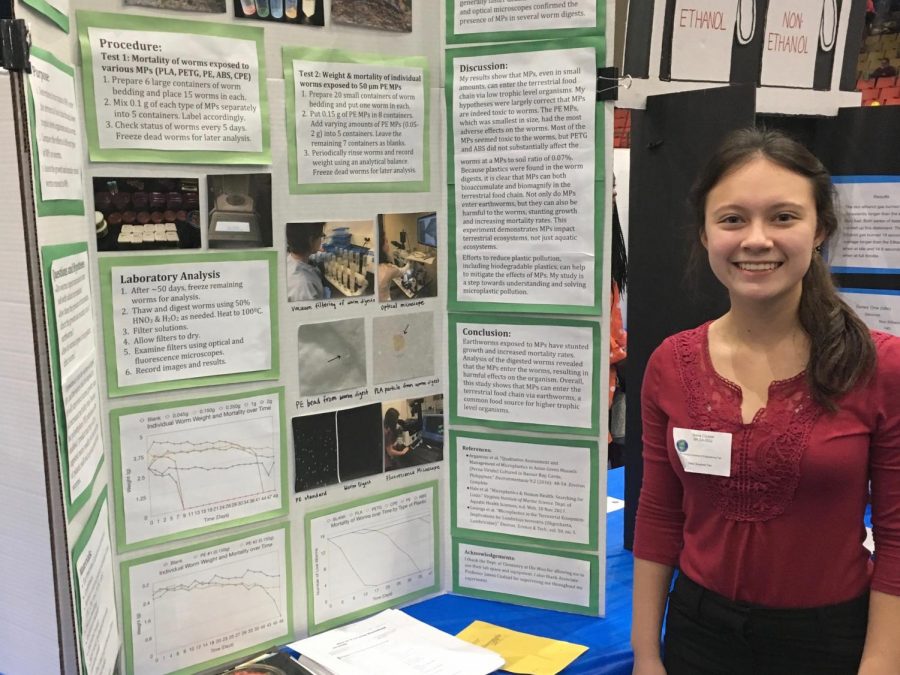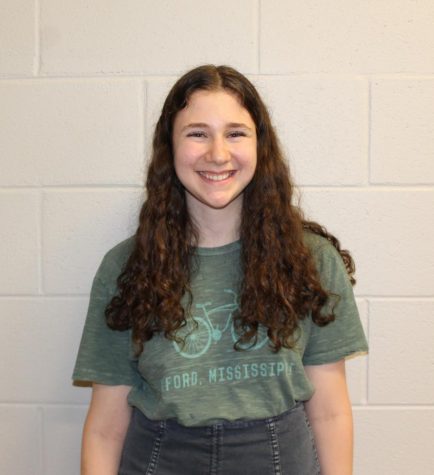Sibling duos compete at regional, state science fairs
Junior Siena Cizdziel stands in front of her award-winning science fair project. For the project, she studied the effects that small pieces of plastic can have on the ecosystem.
April 16, 2018
Siblings are often compared to each other, but for these siblings, science seems to run in the family. At the both the regional and state science fairs this year, many different siblings took the top prizes.
“I won the Justice Manning Award for Environmental Excellence, it’s just like an environmental award, and that came with fifty dollars at regionals and one hundred dollars at state,” junior Siena Cizdziel said.
Siena and her sister, Claire Cizdziel, were the only two at the regional science fair competition to win the Best of Fair awards that carries them all the way to the international competition in Pittsburg, Pennsylvania this coming May. To get to this point, both sisters did projects centered around the inclusion of microplastics in ecosystems. According to the National Oceanic and Atmospheric Administration, microplastics are small pieces of plastic that are less than five millimeters long that can be harmful to life on earth.
“What I did was I had worms, and I exposed them to microplastics and saw their growth and mortality rates based off of the microplastics and saw how the microplastics affected their health,” Siena said. “Then afterwards I went to a lab and looked at digests of the worms and saw if there were plastics inside the worms. Basically, that was to see if microplastics could enter the terrestrial food chain, and if they could, then they can biomagnify and bioaccumulate in the food chain and enter higher trophic-level organisms.”
Claire’s project took the focus to the aquatic ecosystem.
“I did mine on quantifying microplastics in the Mississippi River, a source of pollution in gulf-coast seafood,” Claire said. “Last year I found microplastics in Gulf coast shrimp in their colon, so this year I looked at if they are microplastics in the Mississippi River, so I just got water samples, and then filtered them and looked at them with different spectroscopy instruments, and I calculated that there are 200 million microplastics flowing into the Gulf of Mexico each day from the Mississippi River.”
Brothers Kareem and Marawan Elgohry also found success at the science fair. Marawan, who was trying to find green energy from moving vehicles by attaching a magnet and connecting wires to a car and testing for possible renewable energy, won first place at the state science fair in the Engineering category and achieved the Arizona State University Sustainability Award at the regional fair. Marawan believes he won this award due to the nature of his project.
“I think because I’m trying to gain energy that’s currently not being used, and it’s not getting any green house gas emission,” Marawan said. “It’s very environment safe, so it’s just a better way to get energy.”
Kareem also looked at cars in his project, but he took a different approach.
“My project was on the assessment of turn signal usage and finding solutions on how to mitigate the associated accidents,” Kareem said.
For his work, Kareem received the fourth place prize at the state science fair in the Behavioral and Social Sciences category as well as other awards at regionals.
“I got an award for Achievement in Psychological Science because part of my project was about the behavior of drivers and why they do or don’t use turn signals,” Kareem said.
With all of these awards under their belt, Siena said she sometimes teases her sister about the quality of her work, but both sisters said they help each other out and try to build up each other’s work.
“We used the same instruments to test if there were microplastics, and our dad helped us on using the instruments,” Siena said. “Then, of course, I kind of tear her’s down in a way, but we kind of both build up the idea of microplastics, and it kind of works together in that it’s land and water.”
Kareem believes that, sibling or not, the science fair can be a beneficial experience for everyone to partake in.
“I think science fair is an enjoyable experience, and it takes a lot of effort if you like to do really well, but I think everybody has to start somewhere and start on a project and gain experience on how to present and things of that nature,” Kareem said.




